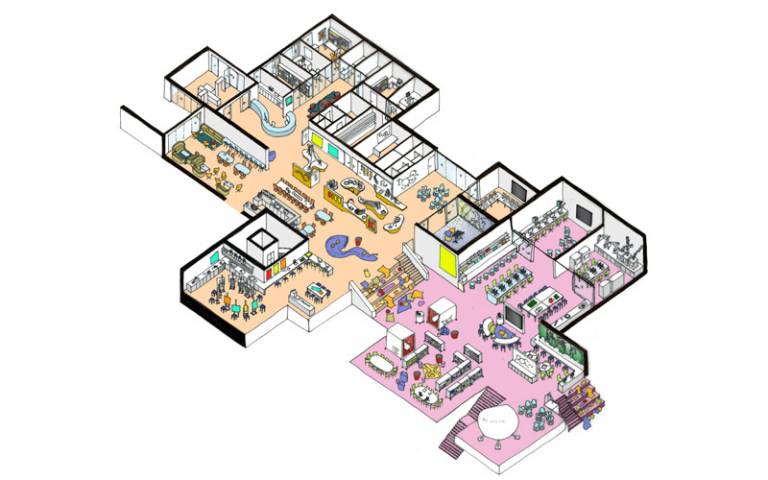'STEAMing ahead': The Bartlett Global Centre for Learning Environments' first seminar
4 April 2019
The Bartlett Global Centre for Learning Environments (BGCLE) chose the subject of STEAM for its first seminar, demonstrating how it is thinking differently about learning environments. BGCLE is an important part of the Bartlett Real Estate Institute.

STEAM – Science, Technology, Engineering, Arts and Maths – takes a new approach to organising learning and that potentially changes the places of learning.
“STEM – science, technology, engineering and maths – has now been accepted but the arts are sometimes given less attention in schools and can be vulnerable to funding cuts. STEAM draws all the skills together, offering every child the crossover skills needed in future and giving every child the chance to work out where they flourish.
Professor Alexi Marmot, Director, BGCLE
The London Borough of Camden has established a STEAM Commission to highlight the area’s STEAM economy and to encourage greater fusion in creative, digital and scientific education. Programme manager Danielle Tobin outlined to the audience of educationalists, architects and designers, how Camden Council is working with employers to focus on the skills they require while also helping other London boroughs to adopt STEAM.
The speaker line-up included inspirational Andria Zafirakou, winner of the $1million Global Teacher Prize 2018. An art and textiles teacher at Alperton Community School, Ms Zafirakou used her prize money to establish Artists in Residence, connecting visual and performing artists with schools to provide learners with a rounded curriculum including arts education.
A STEAM approach to the built environment was illustrated by Michál Cohen, director at Walters & Cohen Architects. The practice’s design for a STEAM school in Qatar demonstrated the importance of visibility and connectivity.
Dr Zehlia Babci-Wilhite, adjunct professor at the University of San Francisco and editor of “Promoting language and STEAM as human rights education”, explored the importance of language in education. With the dominance of English and other colonial languages, and many minority languages dying out, education often does not take place in a student’s native tongue, impacting on the education experience and outcomes.
Dr Hilary Aylesworth, of SAM Labs which delivers curriculum-aligned courses in STEAM and coding, outlined implementation of STEAM, with its transdisciplinary, “hands-on, minds-on” approach to teaching, emphasising student interest, creativity and problem-solving, and metacognition.
The lively audience discussion that followed raised questions about open-plan designs for schools, the emphasis on exams and the constraints that budgets and timetables impose, generating further areas for the Bartlett Global Centre for Learning Environments to debate in future.
“The event raised fundamental questions on the purpose of teaching. Is it to shape obedient people who know how to learn by rote and pass exams in traditional subjects? Or is it to make enquiring, creative citizens for the next decades, filling the future needs of our evolving economy?” said Prof Marmot.
“Because STEAM is still new, it needs the teaching and educational communities to further develop their ideas and to work together with the built environment community – architects, planners, surveyors bursars, estate managers – to develop, test and improve new models for future places of learning. The Bartlett Global Centre for Learning Environments will identify positive environments for STEAM and other learning innovations.
 Close
Close

